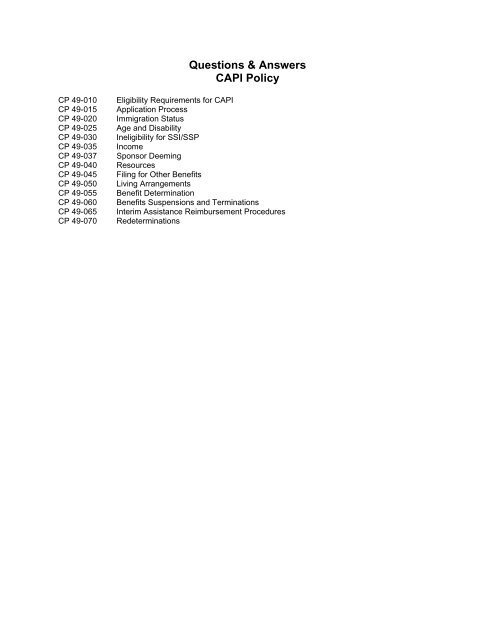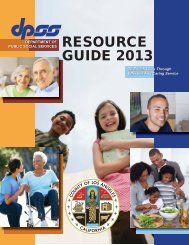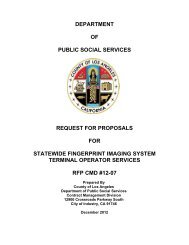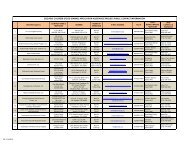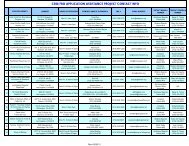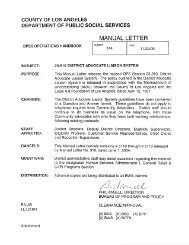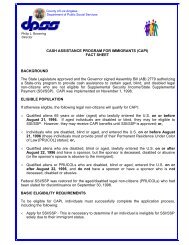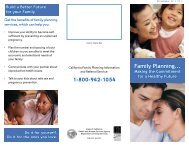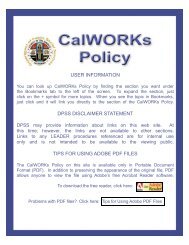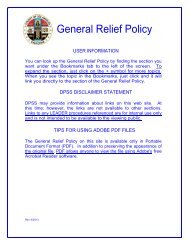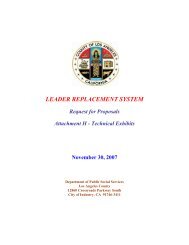Questions & Answers CAPI Policy
Questions & Answers CAPI Policy
Questions & Answers CAPI Policy
You also want an ePaper? Increase the reach of your titles
YUMPU automatically turns print PDFs into web optimized ePapers that Google loves.
<strong>Questions</strong> & <strong>Answers</strong><br />
<strong>CAPI</strong> <strong>Policy</strong><br />
CP 49-010<br />
CP 49-015<br />
CP 49-020<br />
CP 49-025<br />
CP 49-030<br />
CP 49-035<br />
CP 49-037<br />
CP 49-040<br />
CP 49-045<br />
CP 49-050<br />
CP 49-055<br />
CP 49-060<br />
CP 49-065<br />
CP 49-070<br />
Eligibility Requirements for <strong>CAPI</strong><br />
Application Process<br />
Immigration Status<br />
Age and Disability<br />
Ineligibility for SSI/SSP<br />
Income<br />
Sponsor Deeming<br />
Resources<br />
Filing for Other Benefits<br />
Living Arrangements<br />
Benefit Determination<br />
Benefits Suspensions and Terminations<br />
Interim Assistance Reimbursement Procedures<br />
Redeterminations
Cash Assistance Program for Immigrants<br />
QUESTIONS & ANSWERS<br />
CP 49-010 Eligibility Requirements for <strong>CAPI</strong><br />
Q. Are <strong>CAPI</strong> applicants with a lawful Date Of Entry (DOE) after August 21, 1996<br />
required to apply for SSI?<br />
A. Yes, all <strong>CAPI</strong> applicants, regardless of their lawful DOE, are required to show proof<br />
that they have applied for SSI six months prior to their <strong>CAPI</strong> application.<br />
Immigrants who have not applied for SSI prior to their <strong>CAPI</strong> application must do so<br />
as part of their <strong>CAPI</strong> application process.<br />
CP 49-015 Application Process<br />
Q. Are <strong>CAPI</strong> applicants with a lawful Date Of Entry (DOE) after August 21, 1996<br />
required to apply for SSI?<br />
A. Yes, all <strong>CAPI</strong> applicants, regardless of their lawful DOE, are required to show<br />
proof that they have applied for SSI six months prior to their <strong>CAPI</strong> application.<br />
Immigrants who have not applied for SSI prior to their <strong>CAPI</strong> application must do so<br />
before their <strong>CAPI</strong> application can be approved.<br />
CP 49-020 Immigration Status<br />
Q. Is a refugee eligible for <strong>CAPI</strong> benefits?<br />
A. A refugee may be eligible to <strong>CAPI</strong> seven years after he/she is granted refugee<br />
status by USCIS.<br />
NOTE: Refugees may apply for and be eligible to SSI benefits during their first<br />
seven years as refugees.<br />
.<br />
Q. Can an individual with an immigration status under the Violence Against Women<br />
Act (VAWA) be eligible for <strong>CAPI</strong> benefits?<br />
A. Yes a VAWA immigrant may be eligible to <strong>CAPI</strong> if he/she meets the rest of the<br />
<strong>CAPI</strong> eligibility criteria.<br />
CP 49-025 Age and Disability<br />
Q. Can a person under 65 years of age be eligible to <strong>CAPI</strong>?<br />
A. Yes, a person under 65 years of age may be potentially eligible to <strong>CAPI</strong> if he or<br />
she meets the disability criteria, as well as the rest of the eligibility criteria.<br />
Q. Who makes all blindness and disability determinations?<br />
A. The State Disability and Adult Programs Division (DAPD) makes all blindness<br />
and disability decisions based on medical documentation submitted by the<br />
applicant/participant and using existing blindness and disability criteria.<br />
CP 49-030 Ineligibility for SSI/SSP<br />
Q. Are all <strong>CAPI</strong> applicants required to apply for SSI/SSP?
A. Yes, all individuals, except individuals with a Persons Residing Under the Color<br />
of Law (PRUCOL) immigration status, must apply for SSI/SSP as part of the<br />
<strong>CAPI</strong> eligibility criteria.<br />
CP 49-035 Income<br />
Q. How much income may a person have and still be eligible to <strong>CAPI</strong>?<br />
A. A person’s countable income must be below the <strong>CAPI</strong> payment amount for the<br />
person to be eligible for a full or partial <strong>CAPI</strong> payment.<br />
CP 49-037 Sponsor Deeming<br />
Q. Can immigrants with a lawful Date Of Entry (DOE) after August 21, 1996 be<br />
exempt from sponsor deeming?<br />
A. Yes, an immigrant with a post August 21, 1996 lawful DOE may be exempt from<br />
sponsor deeming if s/he meets one of the applicable exceptions.<br />
Q. Is the spouse of a deceased sponsor responsible for supporting the immigrant?<br />
A. No, sponsorship deeming stops when the sponsor dies as long as the surviving<br />
spouse did not sign the Affidavit of Support.<br />
Q. Is the sponsor’s spouse’s income deemed to the immigrant if the marriage took<br />
place after the sponsor signed an Affidavit of Support?<br />
A. Yes, the sponsor’s spouse’s income is deemed to the immigrant regardless of<br />
when the marriage took place (see <strong>CAPI</strong> Handbook, Income Chapter, Sec. M.2).<br />
CP 49-040 Resources<br />
Q. How many resources is a noncitizen or couple allowed to be eligible for <strong>CAPI</strong>?<br />
A. To be eligible for <strong>CAPI</strong>, an individual is allowed to have up to $2,000 of onexcludable<br />
resources for one person or $3,000 for a couple.<br />
CP 49-045 Filing for Other Benefits<br />
Q. Is an application for other benefits a <strong>CAPI</strong> eligibility requirement?<br />
A. Yes, to be eligible or remain eligible for <strong>CAPI</strong>, an applicant/participant must file<br />
and pursue any other cash benefits for which she or he may be eligible.<br />
Q. What is the <strong>CAPI</strong> SSI Advocacy Program (SSIAP)?<br />
A. <strong>CAPI</strong> SSIAP is a component of <strong>CAPI</strong> to assist <strong>CAPI</strong> applicants/participants who<br />
are potentially eligible for SSI.<br />
CP 49-050 Living Arrangements and Benefit Categories<br />
Q. Can a resident of a licensed Non-Medi-Cal Out-Of-Home Care (NMOHC) facility be<br />
eligible to <strong>CAPI</strong>?<br />
A. Yes, an elderly or disabled immigrant residing in a licensed NMOHC may be<br />
eligible to <strong>CAPI</strong> if s/he meets all the <strong>CAPI</strong> eligibility criteria and the facility licensure<br />
is verified.<br />
NOTE: Per Medi-Cal Program staff, Medi-Cal does not pay for room and board for<br />
an elderly immigrant residing in a licensed NMOHC facility. Medi-Cal only<br />
covers some medical related expenses.
Q. Is an immigrant resident of an NMOHC eligible to both the NMOHC <strong>CAPI</strong> rate and<br />
In-Home Supportive Services (IHSS) at the same time?<br />
A. No, a resident of an NMOHC may not receive <strong>CAPI</strong> and IHSS simultaneously.<br />
S/he may receive only one of the two. It is the person’s choice.<br />
CP 49-055 Benefit Determination<br />
Q. Can benefits be deposited directly into a participant’s bank account?<br />
A. Yes, direct deposit is one of three options available to participants to receive or<br />
access their <strong>CAPI</strong> benefits. The other two alternatives are through electronic<br />
issuance process called Electronic Benefit Transfer (EBT) or by mail<br />
Q. Is Aid Paid Pending (APP) considered an overpayment if the hearing decision<br />
upholds the County’s action?<br />
A. Yes, per State regulations, APP is considered an overpayment if the Administrative<br />
Law Judge rules in favor of the County.<br />
CP 49-060 Benefit “Suspensions” and Terminations<br />
Q. What is a difference between a suspension and a termination of benefits?<br />
A. A suspension is a temporary discontinuance of benefits. Benefits may be<br />
reinstated within 12 months of the suspension action if a new application is<br />
submitted within the same period of time. Benefits are reinstated the date the<br />
application is submitted, or the first day the individual meets all the eligibility<br />
requirements, whichever is later. An individual whose <strong>CAPI</strong> benefits are<br />
terminated must submit a new application to have eligibility re-determined.<br />
Benefits on these cases begin the first date of the month following the month the<br />
application was received.<br />
CP 49-065 Interim Assistance Reimbursement (IAR) Procedures<br />
Q. When is <strong>CAPI</strong> assistance reimbursable?<br />
A. Any <strong>CAPI</strong> paid while an SSI application is pending approval is considered to be<br />
interim assistance and is subject to recovery/reimbursement once SSI is approved.<br />
Q. When does the IAR period begin and end?<br />
A. The IAR period begins the first day of the month following the SSI application<br />
month, or the month the person becomes eligible for SSI benefits. The IAR period<br />
ends with and includes the month the SSI benefits begin.<br />
CP 49-070 Redeterminations<br />
Q. What is the purpose of a redetermination?<br />
A. The intent of a redetermination is to periodically ensure that only eligible persons<br />
receive assistance and in the amount to which they are entitled.<br />
Q. How frequently is a redetermination done?<br />
A. All <strong>CAPI</strong> cases have eligibility redetermined within 12 months of the participant’s<br />
initial benefit payment date and every 12 months thereafter.


